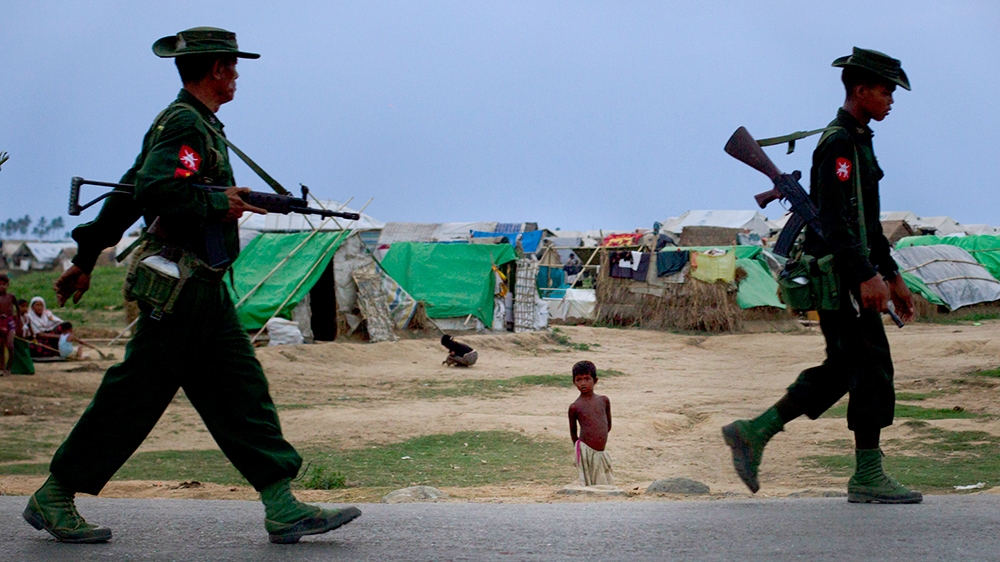Myanmar military gets billions from profitable business: Amnesty
Amnesty International releases documents on MEHL, a company that has channelled up to$18bn in dividends to the military.

A secretive Myanmar conglomerate with links to international businesses was accused on Thursday of directly bankrolling the country’s military, including those who have allegedly committed atrocities against Muslim Rohingya and other minority ethnic groups.
Amnesty International says its investigations into Myanmar Economic Holdings Limited (MEHL) show Myanmar’s military has received dividends of as much as $18bn from the Yangon-based company over the years. Its entire board is made up of senior military officials, it added.
Keep reading
list of 4 itemsRussia-Ukraine war: List of key events, day 782
Mapping Israel-Lebanon cross-border attacks
What you need to know about Iranian and Israeli missiles
“The perpetrators of some of the worst human rights violations in Myanmar’s recent history are among those who benefit from MEHL’s business activities,” said Mark Dummett, Amnesty’s Head of Business, Security and Human Rights as the human rights group released its report, which was based on leaked official documents.
“These documents provide new evidence of how the Myanmar military benefits from MEHL’s vast business empire and make clear that the military and MEHL are inextricably linked.”
MEHL shareholder records show the company to be fully owned and controlled by active and retired military personnel. Military units – including combat divisions assigned to Rakhine State, where conflict has deepened in recent years – own about a third of the company, Amnesty said.
Among those who directly benefit from the company is Myanmar’s top military commander, General Min Aung Hlaing, Amnesty said. Between 2010 and 2011, he owned 5,000 shares and received an estimated $250,000 in payments, according to the documents obtained by Amnesty.
|
|
The general has been accused of overseeing the military campaign against the Rohingya, and the United Nations has called for his investigation and prosecution in relation to genocide and war crimes.
On Tuesday, two soldiers from Myanmar also revealed that they were given orders by their superiors to kill and rape Rohingya villagers during a brutal 2017 rampage, which forced more than 700,000 Rohingya to flee to neighbouring Bangladesh.
General Min Aung Hlaing and the Myanmar military have yet to comment on the latest report. But the military has previously denied reports that it carried out violence against the Rohingya in Rakhine.
Sprawling business interest
MEHL has not yet responded to the Amnesty report, which also calls on the government to “break the link” between the armed forces and the country’s economy.
The company has sprawling interests across mining, manufacturing and banking, and works with a number of international companies from China, Japan, South Korea and Singapore.
Companies listed as partners including Kirin Holdings, a Japanese drinks company, as well as the property developer INNO Group, clothing exporter Pan-Pacific, and steelmaker POSCO – all from South Korea.

Also included are RMH Singapore, a Singaporean fund with a tobacco operation in Myanmar, and Wanbao Mining, a Chinese metal mining company.
Two Myanmar companies, Ever Flow River Group Public Co Ltd (EFR), a logistics company, and Kanbawza Group (KBZ), which is involved in mining jade and rubies, were also listed.
Amnesty said that the leaked documents and shareholder report were provided by Justice for Myanmar, an activist group that campaigns for justice and accountability for the people of Myanmar.
The documents provide information on the “considerable annual dividend payments” that shareholders have received since MEHL was established in 1990.
One document is a filing that was lodged by MEHL with Myanmar’s Directorate of Investment and Company Administration (DICA) in January 2020. DICA is a government agency that serves as a registry for companies.
It states that MEHL is owned by 381,636 individual shareholders, who are all serving or retired military personnel, and 1,803 “institutional” shareholders, consisting of “regional commands, divisions, battalions, troops, war veteran associations”.
‘Shrouded in secrecy’
|
|
The total amount of dividend payments made to shareholders during the 20-year period amounted to more than 107 billion Myanmar kyat – about $18bn based on the official exchange rate of $1 to 6 Myanmar kyat used by Amnesty.
MEHL transferred 95 billion kyat ($16bn) of the total to military units, including those that operated in Rakhine State, home to the Rohingya and where the military is now battling fighters from the Arakan Army, an ethnic Rakhine group.
The military units that operated in Rakhine reportedly owned more than 4.3 million MEHL shares and received payments of more than 1.25 billion kyat ($208m) in just one year between 2010 and 2011.
“This link clearly provides the military with substantial revenue on top of its official budget, but the exact nature of the relationship is shrouded in secrecy,” Amnesty said, as it called for reforms.
It also urged the government to establish a fund, using MEHL’s profits, to compensate the victims of alleged human rights violations by military units that are financed by or are shareholders of MEHL.
![Rohingya refugees in Kutupalong-Balukhali refugee camp, Cox's Bazar, Bangladesh, August 9, 2018 [File:Sorin Furcoi/Al Jazeera]](/wp-content/uploads/2019/08/de714820fb284b679b5356640e9abd1f_18.jpeg)
In its reply to the report, the South Korean company Pan-Pacific said it was terminating its business partnership with MEHL.
The Japanese company, Kirin, and the Myanmar company KBZ told Amnesty that they were reviewing their relationship with MEHL.
Kirin is one of the world’s largest brewers, and its drinks, such as Kirin, San Miguel, Lion and Fat Tire are sold in bars and shops across the world.
Other companies mentioned in the documents have not made any commitments about their ties to MEHL, or did not respond to Amnesty’s request, the organisation said.
Meanwhile, Myanmar’s Ministry of Transport and Communications blocked the contents of the report published by Justice for Myanmar, saying the website was spreading “fake news”.
Justice For Myanmar said the move was a bid by the government to silence its critics.